Selling SF & Fantasy: 1969 Was Another World
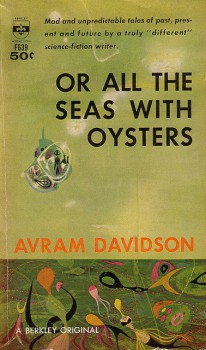 I think what many aspiring writers today fail to grasp — very much as a result of not having been there — is that 1969 was another world.
I think what many aspiring writers today fail to grasp — very much as a result of not having been there — is that 1969 was another world.
Books were sold and distributed very differently. Big chain bookstores barely existed. There were many times more distributors than there are today. Science fiction mass-market paperbacks could be found in drugstores or bus stations, as could the digest magazines.
It was the time of the much maligned “science fiction ghetto” but really a time of innocence, in which we tended to assume that if you made it into the pro ranks, you were there for life. (How else could a writer as unimportant as, say, Robert Moore Williams have continued to publish over 40 years?)
There were no post-novelist writers, i.e. good, respected writers still writing but unable to sell novels anymore.
As somebody commented in one of those very early SFWA Forums I have been reading (I have them back to issue #3), “It’s a seller’s market. We’ve never had it so good.” This from about 1968.
It was a time in which a writer did not have to worry about selling his fourth novel because of the sales record of the previous three.
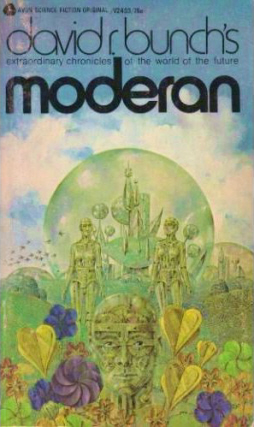 Pretty much anything with a science fiction cover on it sold about as much as anything else with a science fiction cover.
Pretty much anything with a science fiction cover on it sold about as much as anything else with a science fiction cover.
There might be exceptions, like Dune or Dangerous Visions or Stranger in a Strange Land, but, by and large, a science fiction book sold like a science fiction book and it did not much matter what was in it.
This gave the field a tremendous freedom it has now lost. It meant that things like Avram Davidson story collections or RA Lafferty books were actually possible in mass-market paperback.
It meant you could even do David Bunch’s Moderan as an Avon mass-market paperback.
I will defer to the superior knowledge of writers such as Silverberg and Malzberg, who have a much greater understanding of this period from personal, insider experience, but I have the impression that ANY SF paperback of that period could be relied on to sell somewhere between 30-50,000 copies.
I can remember Lin Carter telling me about one of the Ballantine Adult Fantasy books which was an utter disaster and sold a mere 15,000 — pretty good by today’s standards.
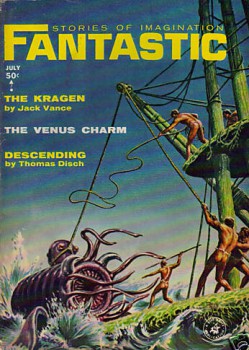 I can also remember when Ted White drew gasps of horror by announcing that the most recent issue of Fantastic magazine, circa 1975, had sold a mere 25,000 copies on the newstand.
I can also remember when Ted White drew gasps of horror by announcing that the most recent issue of Fantastic magazine, circa 1975, had sold a mere 25,000 copies on the newstand.
This was the lowest prozine circulation figure on record. Of course none of the magazines are doing nearly as well as that today.
Of course, too, there were real NEWSTANDS then, something many of you perhaps do not remember.
What I think illustrates how different the time was quite well is a letter that James Blish wrote to the British fanzine Cypher about 1972, in which he bemoans that one of his Ballantine short-story collections (not named, but it seems to be So Close to Home, 1961) has “died the death” and gone out of print in mass market paperback AFTER ELEVEN YEARS.
You understand how that just does not compute in today’s world. Midlist writer? Story collection in mass-market paperback?
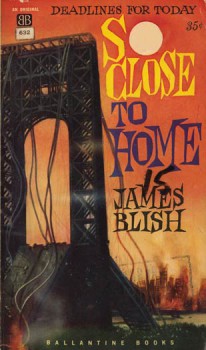 Anything at all in print for eleven years?
Anything at all in print for eleven years?
The latter-day equivalent of Blish today would probably have his collections published by some fan-run press, print-on-demand. They would never get into bookstores, let alone bus stops.
Unless you understand the period, all the statistics in the world will tell you nothing. History is more a matter of what people experienced and felt than a bunch of numbers.
As for what happened to New Wave science fiction at roughly the same time, well, we cannot help but notice that it was all pretty well flushed out of the system by 1975.
Anything that even looked like New Wave was gone. Publishers went out of their way in cover designs and blurbs to emphasize that their books were NOT New Wave.
I remember a blurb on a Larry Niven paperback that explicitly said, “science fiction in a grand old tradition.”
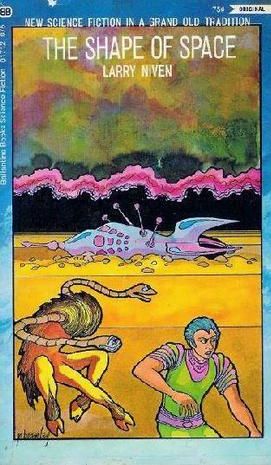 Of course what was happening, inevitably, was that science fiction was fragmenting, and it was no longer ONE THING the way it was doubtless perceived by many in the 1950s.
Of course what was happening, inevitably, was that science fiction was fragmenting, and it was no longer ONE THING the way it was doubtless perceived by many in the 1950s.
(That it was never one thing, even in Gernsback’s day is another matter. Perception equals reality.)
If you talk to readers from that period (i.e. fans who are about sixty today) many of them will tell you that the term “New Wave” became label for something to AVOID. If a book looked like New Wave, they did not buy it.
Many will tell you that the reason for this is that they were outraged by Damon Knight’s anthology series Orbit, and felt burnt, and were much more wary about trusting a book just because it was packaged as science fiction.
(I recently quoted a lady who, decades later, defined “New Wave” as “those awful Orbit stories.”)
Of course the true picture today is hard to get, because nothing stays in print anymore.
Even the classics are gone. (Is James Blish’s Hugo Award-winning A Case of Conscience in print anywhere? I mean the Ballantine text. I know the novelet is in a NESFA book.)
 It would be more instructive to look at what had been in print in 1970 and was gone by 1980.
It would be more instructive to look at what had been in print in 1970 and was gone by 1980.
Many of the writers associated with Orbit and New Worlds were gone. Writers like Langdon Jones and Peter Tate (Anybody remember that name?), and in general, a lot of British writers were disappearing from the American market. (This is the period in which Richard Cowper and DG Compton disappeared.)
This is why we can’t discuss the anthologies Roger Elwood as an isolated phenomenon like a specimen on a slide. Too many things were happening simultaneously.
But there WAS a reaction against the New Wave. This DID push a lot of things out of the American market.
Darrell Schweitzer’s last article for us was Urban Legends and What Entropy Means to Me.
In 1969, at the consumer end, if you wanted portable entertainment, reading was about it. I think your only other option was a small transistor radio. Of course I was four, so memory’s a bit vague.
At the publisher and vendor end, data was more expensive. Those distributors who were filling wire racks (like the one at Snyder Drug in Stillwater MN, where I bought my first paperbacks in the 70s — it took up about 5-8% of the store’s square footage, as I recall–that includes the substantial magazine selection) knew what was selling where.
Nowadays anyone can quote my Amazon or Barnes and Noble rankings and question how much I really know about the field.
Then, I have heard complaints that advances and the like were not based on sound numbers but on hype.
Unfortunately this already hashed out elsewhere, in which a number of Darrell’s claims were proven to be false, including magazine circulations, his remarks about ORBIT, and anything regarding out-of-print books. Hint: A CASE OF CONSCIENCE has been in print, in the original edition, from Del Rey, since 2000. It would have taken five seconds to check that out, on Amazon. Real research. :p
You do know what publishing cycles are, right? Every once in a while the market requires a shift in packaging, and publishers do so. This is why sometimes some authors, and artists, fall out of favor. I’ve come across it myself, when trying to use art from the 1970s or 1980s and had the chain buyers turn down them completely, citing that they’re too old-fashioned. Never attribute anything to something so nefarious as “It was NEW WAVE!” as just basic publishing cycles and shifts :p Either way, when you make statements like this, can you give me examples that New Wave was indeed gone, and that the cover approach had been abandoned as a direct result? Hell, I can find lots of examples of New Wave-influenced covers into the mid to late 1970s.
With regards to your statement: “If you talk to readers from that period (i.e. fans who are about sixty today) many of them will tell you that the term “New Wave” became label for something to AVOID. If a book looked like New Wave, they did not buy it. Many will tell you that the reason for this is that they were outraged by ORBIT, and felt burnt, and were much more wary about trusting a book just because it was packaged as science fiction. (Remember the lady I quoted who, decades later, defined “New Wave” as “those awful ORBIT stories.”)”
Confusing fandom with readers is a fool’s game, which is something distributors and publishers have told me repeatedly never to do. When you’re selling thousands of copies, or even ten of thousands, you’re selling to a broader market. If we just base opinions on just what fandom says, well, that’s not the entire picture. That’s a major mistake, right there. If ten fans tell you that they hated X, but X sold tens of thousands of copies (if it’s proven), during that time period, then are you going to just repeat what those ten fans told you? That’s silly, on the surface of it. It’s almost as bad as listening to the complaints of five subscribers who send in locs, out of three thousand subscribers. What is that, .0001? Statistically insignificant.
ORBIT ran successfully for more than a decade, for more than twenty-one volumes (!), influenced DANGEROUS VISIONS, and published more important authors than you can shake a stick at. It succeeded, on every level that it probably existed for. It’s hard to ignore that, even harder to attribute to it that the field reacted poorly to it, not when the evidence is clearly positive. So what’s the point, really, in perpetuating any claims otherwise? Which authors associated with ORBIT are gone? Let’s compare that with any author in any anthology published during that time period, and see how many fall out. :p
Let’s see . . . by your contention Langdon Jones is gone, right? So THE EYE OF THE LENS should be out of print, his most famous work? Ooops, no, it’s still in print, from Savoy Books. It has been _since_ 1980, and it was distributed in the US, at one point. Again, this took five seconds to check. For instance, you cite Richard Cowper . . . well, he didn’t disappear. Hell, even Pocket Books was publishing him into the mid-80s. So whence these claims of yours? (For DG Compton he partially faded, probably due to poor sales, nothing to do with New Wave, and moved to writing suspense thrillers for Gollancz and Orion, which are all imported into the US. But more importantly did you forget that Ace did his ASCENDANCIES in 1985?)
Peter Tate . . . well, you might have me there. Though, he was primarily in the Doubleday programme, so, after that petered out, that might have been his only market. Here’s the thing, though. Authors leave our field for any number of reasons. In order to show that New Wave actually hurt its own authors, you’d have to analyze everyone associated with it, take into context the usual attrition rates for any author, and then come to some conclusion. You don’t have that.
Additionally I do want point out that Donald Wollheim actually invested heavily into British authors, for DAW BOOKS, from 1972 through the early 1980s. So, no, your statement is false. British authors weren’t forced out of the US market, any more than previously, as far as I can tell. Unless you can cite examples,with research to back it all up, it’s nothing but speculation.
“But there WAS a reaction against the New Wave. This DID push a lot of things out of the American market.”
There’s always reactions. That’s the nature of publishing cycles. Horror might be hot one day, space opera the next day, or men’s adventure. So I wouldn’t necessarily attribute anything to New Wave being the cause of anything, not without more to work with. But, pray tell, what did it push out? Please cite examples.
Reading this story I got really upset and hammered out a long rave, focusing on conspiracy, that I then deleted. Just sad ’cause though I was a bratty little kid as the market was dying, I was reading tons of these books from the rotary racks in the grocery stores, etc. Yes, I could read the ‘adult’ sci-fi/fantasy when most kids were watching TV and behind on reading. Being in a rural area, I got a bunch of this stuff as it was shuttered out of the major markets and my local theater showed lots of ancient reels, “African Cannibal” movies, and such… Read stuff from used bookstores most of my young life… So I got this nice background, then it disappeared overnight to me, replaced by bland modern “PC” stuff.
Frankly, it makes me want to, in a year or so, collect a bunch of my stories from my upcoming magazine project and publish them. Literally in the format of one of these books, the pulp paper, yellow or green edge stain, a simple color cover. Rather than hammer out a “Conspiracy Theory” I’d LOVE to be wrong about my assumptions.
1. Is there a way, if I’m willing to invest a bunch of money, I can get them printed this 70s/80s style cheap/unit price for a LOT of copies? 1000-5000 or perhaps more? But I mean low, not “You sucker” vanity press price. Nothing fancy. Color cover, plain text, a few line B&W illustration plates.
1a. Double plus bonus if I can get it “Printed in the USA”…forgive my silly nostalgia there.
2. Could I get these in the bookstore without being in a special “Club”? -typed but deleted comment hinting at a certain ‘grove’- For relations with a bookstore, I’d totally accept a publishing agreement where they get a cut if they sell it and if it don’t sell I either pay postage back or they cut half the covers off and dump ’em in the used bookstores, fine by me.
Ultimately, all I want is a “Free Market”. By itself I don’t care if a bunch of publishers ate each other like African Cannibals eating the explorer’s pallbearers until a few were left and they decided to sh-t their own stuff on us based on what they felt like excreting, not what the market bought. What makes me angry is that they might well have set up “Exclusivity” deals that’ll forbid the major bookstores from having anything NOT from their clubs, their distribution rackets…
I’m all for “A free market” and think I’m making/networked with stuff that’ll sell well or at least carve out a nice niche. But a “Controlled Market” on the other hand, that’s what angers me. If I could get them in the bookstores, I’d be totally willing to risk enough money for a nice van or a “Gentelman’s Tour” overseas. Even if it bonked, it’d be fun and worth it for entertainment getting some of the money back eventually and the correspondence.